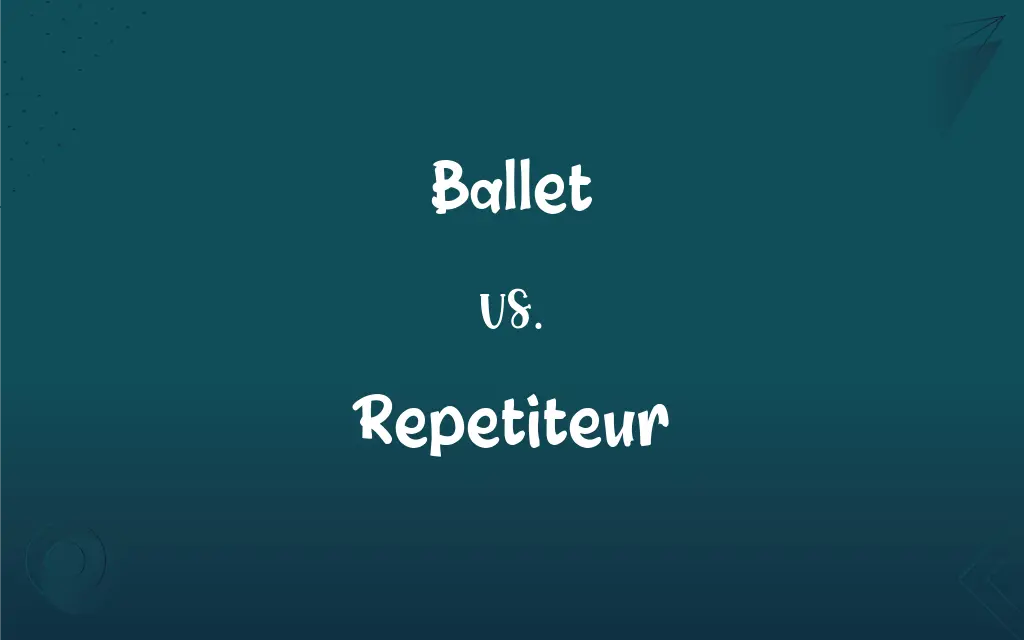Ballet vs. Repetiteur: What's the Difference?
By Harlon Moss || Updated on May 29, 2024
Ballet is a classical dance form characterized by grace and precision, while a repetiteur is a coach who teaches and rehearses ballet dancers.

Key Differences
Ballet is a highly structured and formalized form of dance that originated in the Italian Renaissance courts and later developed into a concert dance form in France and Russia. It involves precise and highly technical movements, including jumps, turns, and poses, performed to music. A repetiteur, on the other hand, is an essential figure in the ballet world, responsible for teaching and rehearsing dancers. They work closely with ballet companies to ensure that performances are executed flawlessly.
In ballet, dancers often start training at a young age and spend years perfecting their skills through rigorous practice and discipline. They perform on stage in ballets that tell stories or convey emotions through dance. Repetiteurs, however, usually have extensive experience as former dancers or choreographers and use this experience to guide and mentor current dancers, helping them interpret roles and refine their performance.
Ballet performances are typically staged in theaters, complete with elaborate sets and costumes, and are accompanied by orchestral music. Repetiteurs operate behind the scenes, conducting rehearsals in studios, giving detailed corrections, and ensuring that every movement aligns with the choreographer's vision.
Both ballet and repetiteurs are vital to the success of a ballet production. Ballet provides the art form and the performers, while repetiteurs ensure the precision and authenticity of the performance, maintaining the integrity of the choreography and the tradition of the dance.
Comparison Chart
Definition
A classical dance form with precise, technical movements
A coach who teaches and rehearses ballet dancers
ADVERTISEMENT
Primary Role
Performance art form
Instruction and rehearsal
Training
Starts at a young age, focuses on technical skills
Extensive dance experience, often former dancers
Performance Location
Theaters with sets and costumes
Rehearsal studios
Contribution
Provides the dance and storytelling
Ensures accuracy and quality of performance
Ballet and Repetiteur Definitions
Ballet
A performance art that tells stories through dance and music.
The ballet company is performing Swan Lake this season.
ADVERTISEMENT
Repetiteur
Focuses on maintaining the choreographer's vision and dance tradition.
The repetiteur ensured that the choreography was faithfully executed.
Ballet
A genre of dance with techniques like pointe work and graceful poses.
She has been training in ballet since she was six years old.
Repetiteur
An expert in choreography and style, guiding dancers in rehearsals.
The repetiteur corrected the dancers' timing and alignment.
Ballet
Requires strength, flexibility, and discipline from dancers.
Ballet dancers undergo rigorous training to perfect their skills.
Repetiteur
Works behind the scenes, providing detailed feedback and corrections.
During rehearsals, the repetiteur gave precise notes to each dancer.
Ballet
A classical dance form characterized by grace and precision of movement and by elaborate formal gestures, steps, and poses.
Repetiteur
A ballet coach who rehearses dancers and ensures performance accuracy.
The repetiteur worked closely with the principal dancer to perfect her role.
Ballet
A theatrical presentation of group or solo dancing to a musical accompaniment, usually with costume and scenic effects, conveying a story or theme.
Repetiteur
Often a former dancer or choreographer with extensive experience.
After retiring from the stage, she became a repetiteur for the company.
Ballet
A musical composition written or used for this dance form.
Repetiteur
A tutor or coach of ballet dancers or opera singers.
Ballet
A classical form of dance.
A classically-trained ballet dancer
Ballet
A theatrical presentation of such dancing, usually with music, sometimes in the form of a story.
Let's go to the ballet in the theatre tomorrow!
Ballet
The company of persons who perform this dance.
Zara joined the ballet at the age of 14.
Ballet
(music) A light part song, frequently with a fa-la-la chorus, common among Elizabethan and Italian Renaissance composers.
Ballet
A (small) ball i.e. roundel on a coat of arms, called a bezant, plate, etc., according to colour.
Ballet
(figurative) Any intricate series of operations involving coordination between individuals.
Ballet
To perform an action reminiscent of ballet dancing.
Ballet
An artistic dance performed as a theatrical entertainment, or an interlude, by a number of persons, usually women. Sometimes, a scene accompanied by pantomime and dancing.
Ballet
The company of persons who perform the ballet.
Ballet
A light part song, or madrigal, with a fa la burden or chorus, - most common with the Elizabethan madrigal composers; - also spelled ballett.
Ballet
A bearing in coats of arms, representing one or more balls, which are denominated bezants, plates, etc., according to color.
Ballet
A theatrical representation of a story performed to music by ballet dancers
Ballet
Music written for a ballet
Ballet
A classical dance form characterized by precise, formalized movements.
The ballet performance captivated the audience with its elegance.
Ballet
Often accompanied by orchestral music and elaborate sets.
The Nutcracker ballet is a holiday favorite.
FAQs
Where do repetiteurs work?
Repetiteurs work in rehearsal studios, coaching and guiding dancers.
How does ballet tell a story?
Ballet tells stories through choreographed dance movements, music, and expressive performances.
What does a repetiteur do?
A repetiteur instructs dancers, rehearses choreography, and ensures the performance meets the choreographer's vision.
Where are ballet performances held?
Ballet performances are typically held in theaters with elaborate sets and costumes.
What skills are needed for ballet?
Ballet requires strength, flexibility, precision, and discipline.
What experience does a repetiteur need?
A repetiteur typically has extensive experience as a former dancer or choreographer.
What is a repetiteur?
A repetiteur is a ballet coach who teaches, rehearses, and ensures the accuracy of dancers' performances.
Do repetiteurs perform on stage?
Repetiteurs do not typically perform on stage; they focus on training and rehearsals.
Can a repetiteur also be a choreographer?
Yes, many repetiteurs have experience as choreographers.
Where did ballet originate?
Ballet originated in the Italian Renaissance courts and later developed in France and Russia.
Why are repetiteurs important?
Repetiteurs are crucial for ensuring the precision and authenticity of ballet performances.
What is ballet?
Ballet is a classical dance form characterized by precise, technical movements and storytelling through dance.
What is a ballet company?
A ballet company is a group of dancers who perform ballet productions.
What is pointe work in ballet?
Pointe work involves dancing on the tips of the toes using special ballet shoes.
What music accompanies ballet?
Ballet is often accompanied by orchestral music.
What is the role of a ballet dancer?
Ballet dancers perform choreographed movements to tell a story or convey emotions.
How do repetiteurs maintain dance tradition?
Repetiteurs ensure that the choreography and performance style remain true to the original work.
What age do ballet dancers start training?
Ballet dancers often start training at a young age, sometimes as early as four or five years old.
How do repetiteurs contribute to a ballet production?
Repetiteurs contribute by rehearsing dancers, providing corrections, and ensuring the performance meets the choreographer's vision.
What is the main difference between a ballet dancer and a repetiteur?
A ballet dancer performs on stage, while a repetiteur coaches and rehearses dancers to perfect their performance.
About Author
Written by
Harlon MossHarlon is a seasoned quality moderator and accomplished content writer for Difference Wiki. An alumnus of the prestigious University of California, he earned his degree in Computer Science. Leveraging his academic background, Harlon brings a meticulous and informed perspective to his work, ensuring content accuracy and excellence.






























































